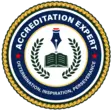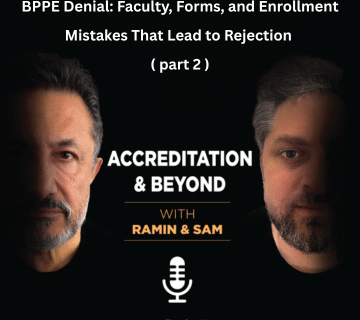In previous articles, we discussed the importance of aligning program objectives, curriculum, admission standards, and staff qualifications with the standards set by the Bureau for Private Postsecondary Education (BPPE). As we continue to explore how to comply with BPPE regulations, this third installment will focus on maintaining financial stability and properly issuing diplomas and degrees alongside stringent record-keeping practices. At Accreditation Expert Consulting, we stand ready to assist institutions through every step of this process, ensuring they meet state authorization and accreditation standards.

Financial Stability
Ensuring Institutional Solvency
BPPE requires that all institutions demonstrate financial stability to effectively provide programs, allow students to complete their programs, meet minimum operational standards, issue timely refunds, and cover operating expenses. For non-Title IV institutions, a key metric is maintaining a current asset-to-liability ratio of at least 1.25 to 1.00 at fiscal year-end.
Title IV Institutions
Institutions participating in Title IV federal funding must achieve a composite score of 1.5 or above as determined by the U.S. Department of Education to be considered financially responsible. Scores between 1.0 and 1.5 may still be deemed responsible but require additional oversight, whereas scores below 1.0 are flagged as financially irresponsible.
Diplomas and Degrees
Awarding Academic Credentials
Institutions must grant a diploma or degree upon completing a program, with a diploma considered equivalent to a certificate for programs below the associate level. For degree-granting programs, the institution must either be accredited by an agency recognized by the U.S. Department of Education or have an approved plan to achieve such accreditation within five years.

Accreditation Challenges and Solutions
Institutions often need help with accreditation, such as meeting enrollment thresholds or aligning program offerings with accreditor standards. It is crucial to select an accreditor that fits the institution’s mission and will accredit its programs. Our team at Accreditation Expert Consulting can guide you through this complex process, helping you avoid common pitfalls and ensuring compliance with BPPE standards.
Records and Transcripts
Comprehensive Record-Keeping
Every student’s file must include their qualifications for admission, personal information, enrollment records, and financial transactions. Records must be maintained for five years, while transcripts must be retained permanently. Transcripts should detail all coursework, grades, and credits earned, including those awarded for prior experiential learning and other recognized achievements.
State Authorization Bppe
Secure and Accessible Records
All records must be securely stored to prevent loss or damage and be readily available for inspection during normal business hours. This ensures transparency and accountability, aiding both institutional oversight and student inquiries.
Conclusion
Compliance with BPPE regulations requires a robust understanding of financial requirements, academic standards, and record-keeping obligations. By ensuring financial solvency, correctly awarding academic credentials, and maintaining meticulous records, institutions can safeguard their operational integrity and uphold the quality of education provided to students.
Institutions can rely on Accreditation Expert Consulting for detailed support and professional guidance on navigating BPPE compliance. Stay tuned for Part 4 of our series, where we will continue to explore additional compliance aspects crucial to your institution’s success. Should you require immediate assistance, please visit our website or contact our expert team to ensure your institution’s compliance and success in the competitive field of higher education.
Get started with a free consultation today! Whether you’re looking for expert advice, strategic planning, or policy development, our team is here to help.?
You can contact Accreditation Expert Consultant in California by calling +1(949)558-8899 or to schedule your consultation, Visit our Contact Us or LinkedIn page.?
Don’t forget to follow us on our social networks to stay updated on the latest news and insights!?




